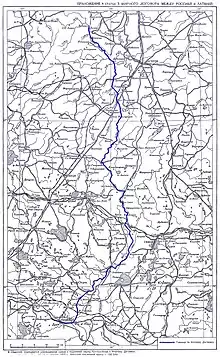| Latvia–Russia border | |
|---|---|
 Terehova border checkpoint, view from the Latvian side | |
| Characteristics | |
| Entities | |
| Length | 214 km (133 mi) |
| History | |
| Established | 1920 |
| Current shape | 27 March 2007 |
| Treaties | Latvian–Soviet Peace Treaty (1920) |
The Latvia–Russia border is the state border between Republic of Latvia (EU member) and the Russian Federation (CIS member). The length of the border is 214 kilometres (133 mi). Since 2004, it became an eastern part of external border of the European Union, Schengen Area and NATO.
History
The Pskov region and Latvia have had historical ties since the founding of the Pskov Republic in the 13th century.[1] From 1925 to 1945 Abrene County was part of the Republic of Latvia. Following the Soviet occupation, on 16 January 1945 the area was transferred from the Latvian Soviet Socialist Republic to Pskov Oblast and renamed Pytalovsky District. After regaining independence in 1991, Latvia initially claimed the previous Latvian territory, on the basis of the 1920 Latvian–Soviet Peace Treaty. The delimitation of the border was completed in 1998, but the treaty on the state border was signed and ratified only on 27 March 2007.[2] It recognised the Pytalovsky District as part of Russia.[3]
As a result of the 2023 Wagner Group rebellion, Latvia immediately sealed its borders from Russia in response to the mutiny until further notice.[4]
Overview

According to the 2007 agreement on the Russian-Latvian State Border,[5] the state border between Latvia and Russia starting from the intersection point of the state borders of Latvia, Russia and Belarus, and ends with the joint borders of Latvia, Russia and Estonia.[6]
Latvia borders only one oblast of Russia, the Pskov Oblast. Russia borders three Latvian municipalities.
The access-restricted Border Security Zone of Russia lies along the border on the Russian side. In order to visit this zone, a permit issued by the local FSB department is required (the only exceptions are international border transit points).[7]
Border crossings
.jpg.webp)
Crossing the border is allowed only at border controls. Most people need a visa on one or both sides of the border. Listed from north:[8]
- road P42 near Pededze
- road P35 near Viļaka (Vientuļi)
- railway Rēzekne–Pskov (Saint Petersburg–Warsaw Railway) near Kārsava
- road E262 / A13 / A116 near Kārsava and Grebņeva
- road P50 near Kārsava and Goliševa[9]
- railway Rēzekne–Velikiye Luki (Moscow–Riga Railway) near Zilupe
- road E22 / A12 / M9 near Zilupe and Terehova, Latvia
Border crossings can also be done by air travel. The only international airport in Latvia is Riga International Airport which, prior to February 2022, used to have scheduled flights among other places to Moscow and Saint Petersburg. The airports at Daugavpils, Liepāja, Jūrmala-Tukuma and Ventspils are also registered as border crossing points.[8]
Following the mobilization announced in Russia related to the 2022 Russian invasion of Ukraine in September, Latvia declared state emergency for three months in border counties and closed the Pededze crossing. [10]
See also
References
- ↑ Янин В. Л. Административное устройство Псковской земли//Новгород и Литва. Пограничные ситуации XIII—XV веков. — М., 1998
- ↑ "Border Treaty between Latvia and Russia". Ministry of Foreign Affairs of Latvia. Archived from the original on 25 August 2017. Retrieved 4 January 2022.
- ↑ East Latvia Map
- ↑ Jack, Victor (24 June 2023). "EU countries bordering Russia on alert after mutiny against Moscow". Politico.eu. Archived from the original on 24 June 2023. Retrieved 25 June 2023.
- ↑ "Договор между Российской Федерацией и Латвийской республикой о российско-латвийской государственной границе от 27 марта 2007 года". Archived from the original on 18 March 2017. Retrieved 28 September 2013.
- ↑ ОПИСАНИЕ- прохождения государственной границы между Латвийской Республикой и Российской Федерацией
- ↑ "Приказ ФСБ РФ от 2 июня 2006 года N 237 "О пределах пограничной зоны на территории Архангельской области"". Rossiyskaya Gazeta (in Russian). 2006.
- 1 2 Document 2015/C 126/10 Official Journal of the European Union
- ↑ Not listed in the source, but signs can be seen on Street view
- ↑ Latvijas pierobežas novados izsludina ārkārtējo situāciju Krievijā sāktās mobilizācijas dēļ (precizēts)